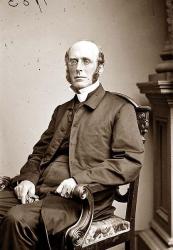1679 - 1707 Hymnal Number: d468 Author of "O thou who all things canst control" in A Collection of Hymns for the use of the Methodist Episcopal Church. Rev. with a Supplement Gmelin, Sigmund Christian, was b. March 15,1679, at Pfullingen in Württemberg. After studying at the University of Tubingen, where he graduated in 1697 and became lecturer in 1700, he was in 1705 appointed assistant pastor at Herrenberg. There he associated himself with the Separatists; denounced the Church as worldly and as requiring a mere outward profession; objected to infant baptism, and departed from the views of the Church on the intermediate state, on the millennial reign, and on the reconciliation of all things.. For these teachings he was deposed in 1706. After living for a time at Dortenbach, near Calw, he retired to Wittgenstein, and finally to Schwarzenau, near Berleberg. He died Oct. 12, 1707, probably at Schwarzenau (Koch, v. 5; Allg. Deutsche Biographie, ix. 274). The only hymn by him translated into English is:—
Ach treib aua meiner Seel. [Watchfulness.] Included as No. 21 in the Anmuthiger Blumen Krantz, 1712, in 21 stanzas of 6 lines, and repeated as No. 231 in the Herrnhut Gesang-Buch, 1735, omitting st. xx. In full as No. 1101 in Schober's Liedersegen, 1769. The only translation in common use is:—
0 Thou who all things canst control, a translation in L. M. of stanzas i.-vi., by J. Wesley, in Hymns & Sacred Poems, 1739 (P. Works, 1868-72, vol. i. p. 12). It was not included in the Wesleyan Hymn Book, 1780; but was given, as No. 130, in Wesley's Pocket Hymn Book, 1785. In England stanzas i., ii. were included as No. 323 in Psalms & Hymns, 1854 (Colonial Church & School Society), and stanzas i., ii., v., vi., as No. 467, in Martineau's Hymns of Praise & Prayer, 1873. In America stanzas. i., ii., iv., v., were included, as No. 146, in the Christian Lyre, 1830, and repeated in the Methodist Episcopal South Collection, 1847; the Unitarian Book of Hymns, 1846; and Boardman's Collection, 1861. Stanzas i.-v. were also included in the Methodist Episcopal Collection, 1849, and the Evang. Association Hymn Book, 1882: stanzas i., ii. in the American Unitarian Hymn Book, 1869: and stanzas i., ii., vi., with a stanza from iii., lines. 3, 4, and v. lines 3, 4, in the Pennsylvania Lutheran Church Book 1868. [Rev. James Mearns]
-- John Julian, Dictionary of Hymnology (1907)
Sigmund C. Gmelin


 My Starred Hymns
My Starred Hymns



